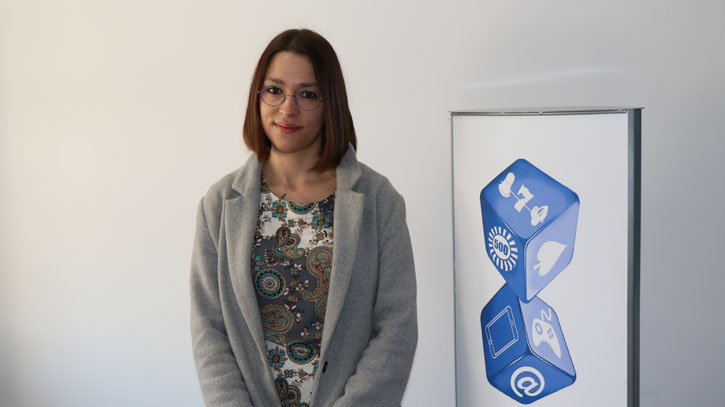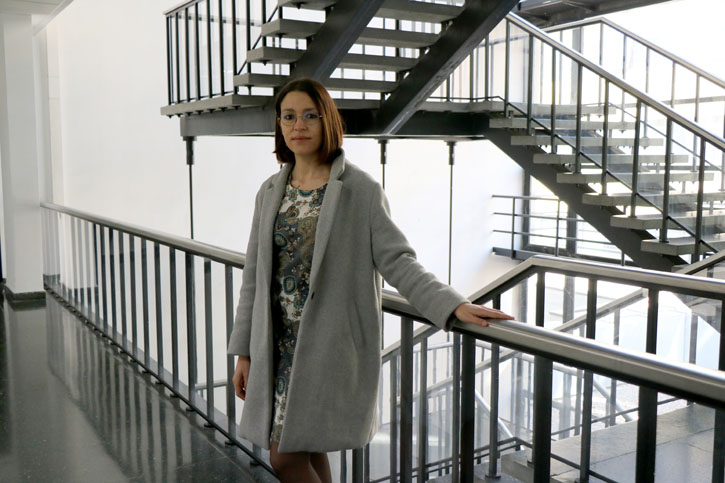
Amparo Luján talks about her work, the theme and how society and the new generations have changed due to the appearance and establishment of information and communication technologies (ICTs). In this interview, she explains how this social phenomenon has had a great impact on the human brain and on psychology at a social and individual level.
- How was her research born?
It is a field that is fully flourishing, not only due to the advancement of behaviour research, but also due to the relevance that technologies have on people today, how society has been structured in this new era and how technologies influence in the way we behave, feel and even how we think. The fact that there are patterns of addiction in the way we interact on a daily basis affects us on many levels, from the normative, the way we should behave daily, to a technological level, which is affecting a large part of the population on a psychological level.
- Who has been most affected by the pandemic in recent years?
Actually, the most vulnerable population is the adolescent one, due to the role that technology represents in their emotional, social and psychological vital development and the roles played by social networks to communicate, to be part of a group and that has come to be defined as the fear of missing out. It is the fear of being left out of them, a kind of dependency imposed by the need to be with the group. It is no longer so much that I want to be connected, but that I have to be and feel that belonging of virtual socialisation that has been part of everyday life and that has somehow been self-imposed. Precisely, young people have greater biological fragility, since they are much more vulnerable when it comes to choosing, maintaining and being able to control this behaviour, which ends up being pathological and counterproductive for their social, personal and emotional development. Hence, it is more worrying in prevention when they are younger. At this stage, we can still give them self-control and awareness guidelines that can protect them.
Cyberpsychology could be described
as the branch of Psychology whose main
objective is to study the effect of information
and communication technologies (ICTs)
- What is the Cyberpsychology Conference Enigmas of the Psychology of the future about?
Cyberpsychology could be described as the branch of Psychology whose main objective is to study the effect of information and communication technologies (ICTs) in various areas such as cognitive, emotional, social and communicative, among others. All these aspects have undergone drastic changes in recent decades, which could be compared between generations taking, for example, on the one hand, digital immigrants characterised as those people who have had to adapt to the technological world, and on the other, called digital natives, who have always lived with this world. This becomes highly relevant when we consider that these effects have not been analysed separately and that, therefore, we do not have information on how these processes have transformed family dynamics and hierarchies, since a child, having greater knowledge about technology, can teach his father on these matters.
- What is the dilemma of the chicken and the egg in video games?
Since video games emerged, various fields of study have debated the possibility that they made people more aggressive. However, the six decades that have passed since video games emerged have not made it possible to answer whether they make people more aggressive, so, somehow, with the incipient strength that neuroscience has taken – that part of the knowledge destined to studying human behaviour and the human brain – has done its share of trying to answer it. For this reason, in this conference I have focused on the answer given by neuroscience on the effect or effects of video games on aggressive behaviour, a problem that seems to me to be quite new, interesting and important to address from this discipline.
Direct effects
- What have been the consequences of ICTs in human psychology?
The introduction of these tools represents a drastic change, this has caused our brain to change with their use, therefore, our way of being, behaving, feeling, thinking and relating. Our frontal lobe is the main area that deals, roughly speaking, with working with information and communicating. It is no coincidence that technologies and ICTs are the two main processes that somehow complement or replace each other. The addiction to technologies awakens the cerebral systems of pleasure, generates dopamine and makes the behaviour repeat itself, which is what we have, on the one hand, in a group of human beings who are learning. The normal thing is that we are all going to be minimally addicted to these innovations, even when it is something expendable, and there is the fine line of when it is pathological and when it is not. This is the point where psychology can act and can decide when we are addicted to technology and when it is a normative use or simply necessary.
- What are the multiple biopsychosocial changes that have developed?
The main ones can be various changes in the brain, we can even say that there is a new neuron, although it sounds exaggerated to say so. As our tendency to use our hands with the mobile has been different, transformations have been observed in a part of the somatosensory lobe that responds to the way we use our fingers to type. The same happens with our frontal system, the one that has taught us the different ways of communicating on a more virtual level. Also, in the way of socialising we have a more virtual contact less face to face.
"Other prevention tools
are training programs for
self-control and awareness skills"
---------------
"Situations such as withdrawal or lack
of stimulation have been described,
when a dependency on technology
has already developed"
- What tools exist for non-dependence on new information and communication technologies (ICTs)?
It depends, because there would be many levels. In the end, they are all recommendations of the use itself, both what psychologists can give us and what the professionals who have created these same systems are going to recommend. It is that you use these applications to control the time of use or you can put the interface in a certain way. Other prevention tools are training programs for self-control and awareness skills, such as learning about the consequences of excessive use of technology and its effects on life, and trying to remedy it. It is very difficult to tell a person not to use something that is giving them pleasure in the brain. We live in an accustomed society where this compulsive use is perpetuated and therefore it is a complicated task.
- What are the effects of the massive consumption of ICTs?
It has a number of consequences. On the one hand, those that could be considered addiction criteria, and among them, the most mentioned would be the fact that it changes your mood. For example, situations such as withdrawal or lack of stimulation have been described, when a dependency on technology has already developed; the tolerance that is usually related to the time factor, that growing need to use more and more devices and, therefore, taking this space away from other more important aspects of your life such as work, school, family and even health. Therefore, there will be a life that is more focused on the consumption of technology and not on self-care, since this is called salience in the case of addictions, which is when the object that is the product of dependence is representative of your life.
"If there is no social and systemic
change in the way we relate
to these tools, we are not going
to have a healthier relationship
with them either"
- Are we at a point of no return with technologies?
I don’t like to be pessimistic, but we could say that with the level of use and the way we function as a community, this is a technological society and we are not going to stop needing these resources. If there is no social and systemic change in the way we relate to these tools, we are not going to have a healthier relationship with them either, and they can have effects on our psychological and, sometimes, physical health, without us being able to get more on a personal level out of these innovations on which we depend in our day to day.
Violence and video games, prejudice or reality?
Gaming culture has turned out to be a breeding ground for video game addiction. This implies the large amount of time that users are exposed to violent content interactively, especially young people. The birth of video games opened the debate on its effects on aggressiveness, still unfinished. The American Psychiatric Association considers that it promotes aggressive states in the short term, however, long-term effects have not been demonstrated. The famous cases of parricide in Elche or Pakistan add an exclamation to this question.
- What would be the recommendations to prevent these events?
First of all, I see a fundamental need that requires a lot of work – and which I am directing precisely in my doctoral work –, is the role of parents in raising children with this technological knowledge, how to work with it and with respect to allow or share that reality. Parents who have lived, possibly, in a world without technology, it is not that they do not understand it, but their reality, perception, understanding or feelings are very different from what a child will live, so there is a generation gap that it already makes that point or union difficult. But this must be solved so that the training and breeding is more effective. The problem lies in one of the fundamental guidelines that the WHO has also tried to stipulate: what is the minimum age for the start of children’s exposure to the digital world.
- Is there scientific evidence that demonstrates an increase in violent attitudes among children due to these games?
There are studies that show that video games increase physical arousal and can make the person in that specific state more aggressive, since many games – especially the most addictive and famous ones – have a violent component, which can cause moments of frustration and provocation, for example, by breaking the gamepad or verbally insulting; those things happen, but from there you have to be careful when saying that the person becomes more violent, because it is a line that science has not been able to prove. Cases like the boy from Elche show at least what to think about it. Technology is not the direct cause of him becoming a murderer. Observing him from the outside, what would have to be done is a forensic psychology analysis, since we do not know if he may have a personality disorder that makes him more aggressive or a type of cold, more psychopathic emotionality, even enough to know that video games more or less have had an influence when it comes to awakening something that he have had within him.
"One of the fundamental guidelines
that the WHO has also tried to stipulate:
what is the minimum age for the start
of children’s exposure to the digital world"
-------------------------------
"At the parental level, it is necessary
to have better control of the time
of use; certain guidelines such as
the order of meals, or activities or study"
- What is being done to prevent this advance of violence or aggressiveness?
At the parental level, it is necessary to have better control of the time of use; certain guidelines, such as the order of meals, class schedules, when they do extracurricular activities or study; control that access is not direct; it is necessary to leave an intimacy to the child, since it is also part of his reality. But you have to be aware of the content that he is absorbing from video games, as well as knowing who he is interacting with. One thing is that he is talking to his friends on social networks and quite another, that he is beginning to make unknown friends. Better parenting is also necessary, that is, fluid communication, so that the child understands why the use of technology is being limited.
- It is much better to act early and to grow up taking into account that technological aspect that is essential for the life of all of us on a personal level and in the new generations, as digital natives, even more so. Therefore, it is very important that parents have it well assumed with all the failures that may exist. That they try to develop this control, try to improve it with their children, but also through mediation with the school, with professionals –if necessary–, and, furthermore, get information on the Internet and with all the knowledge that is being offered to help parents in the upbringing and the treatment they have with their children and technologies.
These activities, Stimulating scientific vocations, are part of the scientific dissemination activities plan of the Scientific Culture and Innovation Unit. They are co-funded by the Ministry of Science and Innovation and the Spanish Foundation for Science and Technology, in addition to having the support of MEDNIGHT GTS, a project associated with the initiative “European researchers’ Night” of the European Union, which has the funding of Marie Skłodowska-Curie actions and call identifier: HORIZON-MSCA-2022-CITIZENS-01 (MSCA and Citizens 2022).














